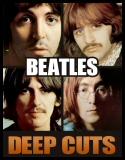The best albums you've never heard, best obscure albums, greatest unknown albums, underrated artists, underrated CDs
The best albums you've never, ever heard (well, probably not, anyway)
04/16/2007
Music Home / Bullz-Eye Home
ALSO: Got a favorite album that you think more people need to hear, or have a comment on one of the albums in our list? Post it at EatSleepDrink Music!
Below is the second half of our "Best albums you've (probably) never heard" list. See the first half here, and don't forget to check out the corresponding interviews for each of the albums below.

Recommended If You Like: The Replacements, The Rolling Stones,
The V-Roys
NYC’s Heap is a great group that could very well be the successors to the Replacements…that is, if the ‘Mats had never turned soft thanks to the overbearing Paul Westerberg, and kept to the snotty, fun time rock of their first few albums. With
On the Cheap, Heap busts through 11 excellent racks of bar band delight. The best of the bunch include the hilarious “Women,” which features the best couplet about aging centerfolds ever, the frenzied “Puerto Rican Girl,” and the not-too-terribly-serious “The Sober Life,” which anyone who’s ever had a few too many can fully appreciate. It continues to amaze me how bands this good – and they’re planted all over the nation – can just not be recognized on a wider scale. To put it bluntly, it’s a fucking crime, and if the industry is indeed in a shake up, then it would do itself a world of good by actually plugging into bands like Heap that are making great music that people really enjoy, rather than continuing to dry hump the prefab wells. Ah, well, after you chew on that for awhile, mark down
On the Cheap for a future purchase, won’t you? –
Jason Thompson
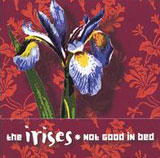
RIYL: Blondie, The Darling Buds, Juliana Hatfield
The debut album by The Irises is a ten-track, five-star stunner. The brand of pop rock the band touches on here with lead vocalist Roxanne Heichert is as catchy as it is moving. This is the way albums used to be made – you know, a reasonable amount of songs that get in and get the job done. Highlights include “Perfect Boyfriend,” the beautiful “I’m That Fool,” and the riveting “Loneliness.” It’s a crime that this album didn’t break out from its indie status into something far bigger, but that’s how it goes with a lot of these albums. Nevertheless,
Not Good in Bed is an album that still gets played to death around here, and is one of those discs that I loved upon first listen. That’s indeed a rarity these days. Here’s hoping the band continues to put out some more excellent music. –
Jason Thompson
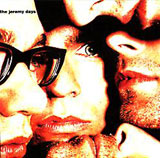
RIYL: a-ha, The Postal Service, Sondre Lerche
It’s getting so it’s almost hard to remember the dark days before the Internet, back when the only real way to find out if a band had released or was going to release another album was to…gasp!...write them a letter. Now, of course, it’s easy to log onto your computer, Google the band’s name, find their official site, and have access to their entire discography. After the Jeremy Days released their self-titled debut in 1988, however, it felt as though they’d vanished into thin air; I never saw any further mention of them in any of the US or UK music publications I regularly read, so, as far as I knew, they were yet another one-album wonder. Not exactly. Turns out the Jeremy Days were pretty big in their native Germany, releasing four more albums before calling it a day not long after 1995’s
Punk by Numbers. I’ve since bought them all, but as fine as they are, that debut is still the one that gets the most spins. It’s bouncy, catchy, sparkling pop music, powered as much by brass as it is by keyboards, resulting in a sound that, at times, isn’t so terribly far removed from Prefab Sprout, and, thanks to production by Clive Langer & Alan Winstanley, shimmers like 24-karat gold. –
Will Harris
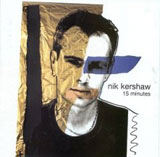
RIYL: Nick Heyward, Colin Hay, Tears For Fears
Nik Kershaw’s profile in the States has never been that high, even when it was at its
highest. His biggest hit, “Wouldn’t It Be Good,” only made it to #46 on the singles charts…and, in truth, it’s probably become better known for the cover of the song on the “Pretty in Pink” soundtrack. Those with a taste for ‘80s artists that extends beyond the mainstream, however, were blown away when Kershaw re-emerged in 1999 with arguably the best album of his career. Produced by Nik himself, with assistance from Steve Lipson, who’d worked with Annie Lennox, the Pet Shop Boys, and Prefab Sprout,
15 Minutes was just the sort of thing people who’d come of age in the ‘80s
should’ve been listening to in the late ‘90s. Kershaw ignored the trends of the day and simply produced an album full of mature pop songs, some hard, some soft, all highly enjoyable. He even dared to revisit “Wouldn’t It Be Good” in a stripped-down setting for an unlisted bonus track. Almost a decade later, Kershaw continues to record new material, all of it highly enjoyable, but
15 Minutes was where he first made his stand and said, “The ‘80s were nice, but this is where I am today.” It’s just a shame more people haven’t paid attention. –
Will Harris
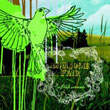
RIYL: Pink Floyd, Radiohead, Snow Patrol
What could be the downside of a band that sounds like a mix between Pink Floyd, Radiohead, and Toad the Wet Sprocket? If you like anything resembling any or all of those bands, not much. Singer, songwriter and multi-instrumentalist Evan Slamka somehow concocted that compelling formula in his music-making head, and, going under the moniker Marjorie Fair, released a stunning major label debut that never really got the props it deserved. Word on the street is the label uneventfully dropped the band, but Slamka’s spacey alternative rock can simultaneously make you float as well as feel ache in your heart…and, after all, isn’t that what music is all about? –
Mike Farley
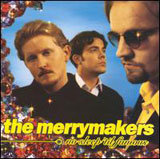
RIYL: Paul McCartney, Jellyfish, The Click Five
No Sleep ‘Til Famous is such a significant, formative album in the evolution of my musical tastes that I feel as though I can’t possibly praise it enough, but I’m going to try, anyway. My discovery of the Merrymakers came courtesy of one man: Bruce Brodeen, the gentleman behind Not Lame Records. He praised the band’s disc to high heaven, and he used a point of reference that meant to the world to me at the time (and, frankly, still does), saying that the band reminded him of Jellyfish. I fell for it hook, line, and sinker, and when I received
No Sleep ‘Til Famous in the mail, I slapped it into the CD player, and I’m in no way exaggerating when I say that the songs were so catchy that they fucking blew my
MIND – particularly the opening trio. “She’s a Radio” had that line about how “she’s a game show where people never lose,” “Spinning My Mind Away” had the Beach Boys references leading into the unstoppable, handclap-powered chorus (
“I don’t know why you deny good vibrations / God only knows”), and “Don’t Tell Me” was a better Paul McCartney song than Macca himself had managed in ages. Beyond that, the harmonies at the end of the chorus of “Monument of Me” were so good that they sent a chill up my spine, “Smiling in the Sky” paid tribute to the Jeff Lynne sound a full decade before L.E.O. got around to it, “I Want to See You Dance Again” is as perfect as jangle-pop gets, and “My High” has a chorus that will be not be denied – but, then, you can make the same claim about virtually every song here. –
Will Harris
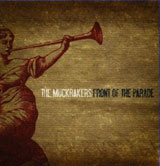
RIYL: Guster, Sister Hazel, Gin Blossoms
The late ‘90s and early ‘00s featured a lot of that acoustic, jam-oriented pop music made accessible by the likes of Dave Matthews, Sister Hazel, and Guster. This was college music that the kids could actually bop around and get high to at the same time. Louisville five-piece band the Muckrakers may have graduated from that school of jangly pop, but their music, at least in my opinion, is better than the music of all of the above artists. You can actually listen to one of their albums start to finish, and it’s about as infectious as strep throat at an elementary school. But even when singer/songwriter Rob Carpenter and company tone things down as they do on “Breathe In, Breathe Out” or “Gone,” it’s clear The Muckrakers know their way around a hook.
Front of the Parade was the band’s Toucan Cove debut, and – lucky for you – they’re still around and making music. So stop what you’re doing, and go buy this one…and then follow that up with everything else the Muckrakers have released. Make them famous already! –
Mike Farley
 |
“Cigarettes & Magazines,” “Through My Door,”
“Breathe In, Breathe Out,” “Gone” |
| Read the interview! |
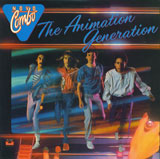
RIYL: Hall & Oates, Steely Dan, Michael Stanley Band
It’s rare when a group of musicians merge their songwriting skills and musical abilities into a product that is greater than the sum of its parts. Novo Combo, though they only released two albums in the early ‘80s, were that kind of band. While their debut was good, it didn’t match the borderline musical genius of the follow up,
Animation Generation. The rhythm guitar tones of (no pun intended) a generation are rampant throughout, tribal percussion balances the steady beat of drummer Michael Shrieve, and the raspy, high-pitched vocals of guitarist Pete Hewlett blend nicely with the softer approach of bassist Stephen Dees. But it was the addition of lead guitarist Carlos Rios that injected magic into Novo Combo’s music. The solo (remember those?) on “Welcome Innervision” might be one of the top five guitar solos in rock history…or, at least, it would be if more people had actually heard it. –
Mike Farley
 |
“Slow Fade,” “Anyone Can See,” “Keep Your Love Alive,”
“Welcome Innervision” |
| Read the interview! |
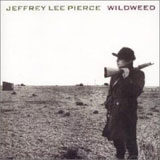
RIYL: John Doe, Tom Waits
It’s hard to break free from a band and launch into a successful solo career. For every Gwen Stefani and Don Henley soaking up the spotlight, there’s a Terri Nunn and J.C. Chavez sulking in the shadows. So the odds are even more against you when you’re trying to make it as a solo artist and your band has barely risen above the status of underground sensation. This was the unfortunate fate of Jeffrey Lee Pierce, who in 1985 branched out from his influential punk-rock band the Gun Club to release
Wildweed. The Gun Club were critics’ darlings in the early ‘80s and released two of the best albums of the L.A. rock scene in just two years (
Fire of Love and
Miami).
Wildweed was slightly different from his work with the Gun Club; it was a little more pop-friendly, but it still retained the dark and nihilistic lyrics that he was known for. Most of the album sounds like some dream combination of the Pixies, the Eagles and David Byrne: punk, country, and general insanity, all at once. After the release of
Wildweed, Pierce continued to record with the Gun Club and released one more solo album in 1992 (under the name Ramblin’ Jeffrey Lee) until his untimely death in 1996, when his notorious hard-living lifestyle of drugs and booze caught up with him. While most indie-rock kids would tell you that the definitive Pierce albums are the first two releases by The Gun Club, don’t forget
Wildweed; it deserves to be placed right next to those early alternative classics. –
James Eldred
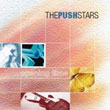
RIYL: Fountains of Wayne, The Gourds, The Blake Babies
Having tried the major labels — and found them lacking — twice, the band opted to go the indie route for their follow-up to the Capitol-distributed
After the Party, and sacrificed nothing in the process.
Opening Time is everything The Push Stars are, distilled into a single album’s worth of great songs: there’s the tongue-in-cheek pop bombast of “Millionaire”; the anthemic beauty of “Meltaway”; the hushed fragility of “Last Night’s Dream.” Lack of major-label funding notwithstanding, the band’s continued low profile after this album’s release is a little baffling — fans of smartly written melodic pop could hardly do better than this. –
Jeff Giles

RIYL: Night Ranger, Styx, Damn Yankees
Hallucination should be terrible, and yet it really isn’t. Recognizing that their brand of FM rock had become passé, Jack Blades and Tommy Shaw (late of Night Ranger and Styx, respectively, and having most recently worked together in Damn Yankees) took Warner Bros.’ advance money and used it to create a back porch album. In and of itself, that’s nothing special; hairy rockers had been going “unplugged” for years even in 1994. This change in volume rarely signified any change in artistic direction, though; acoustic Bon Jovi or Mötley Crüe is every bit as over the top as regular Bon Jovi or Mötley Crüe — it’s just a little quieter and slower. For Shaw and Blades, though, making
Hallucination was an excuse to pay tribute to their shared roots. Rather than sounding like unplugged Night Ranger or Damn Yankees or Styx, the album is full of direct, affectionate references to The Beatles and ’60s/’70s songwriter rock like Buffalo Springfield, Spirit, or The Byrds. Now, it isn’t like these roots are obscure or unique in any way. It’s just that Shaw and Blades play to them intelligently, with a wink and a smile. The album has the airy, relaxed feel of a recording made simply for the fun of it. There are certainly peaks and valleys — “My Hallucination” sounds uncomfortably like Damn Yankees after a
Sgt. Pepper’s marathon, and “I Can’t Live Without You” is the eye-roller its title suggests — but on the whole, it’s better than anything either of them had done before or have done since. (We’re talking about Night Ranger and Styx here, so the whole “better than” thing might be a meaningless compliment, but still.) The rub to all this is that Warner Bros. was in an extreme state of flux in 1995, and
Hallucination fell right through the cracks. This was a shame not only because some of these songs could have been moneymakers, but also because the album’s failure sent Shaw and Blades back to Styx and Night Ranger. This isn’t a knock on those bands (well, not Night Ranger, anyway), but
Hallucination could have been the start of something more interesting. –
Jeff Giles
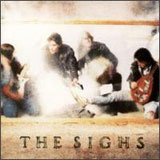
RIYL: Cheap Trick, The Outfield, Gigolo Aunts
If you had to pick the worst possible time for a nicely-polished power pop band to hit the American music scene, in the wake of Nirvana’s
Nevermind would be near the top of most lists. Grunge was the order of the day, and the Sighs were about as far from it as you could get – which is a little ironic, given that their debut album,
What Goes On, was produced by Ed Stasium, whose punk and new wave credits included producing the Ramones’
Road to Ruin and mixing the Talking Heads’
More Songs About Building and Food. (Plus, the dude produced Motorhead’s
1916 album, too!) It also didn’t help that the Sighs were signed to Charisma, who also failed to do much of anything with Jellyfish’s
Bellybutton. What a waste. Virtually every song has a hook that sinks its teeth into you and won’t let go, and the harmonies are to die for. The band released a sophomore effort through Big Deal, but while enjoyable, it was nowhere near the heights set by this debut. Given that you can generally buy a used copy of the disc through Amazon for – no exaggeration here – one shiny penny, there’s no excuse for you to not check it out.
– Will Harris
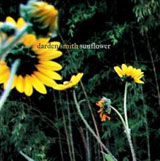
RIYL: Bonnie Raitt, Chris Whitley, Lyle Lovett
There’s a really depressing quote from Smith about this album which opens, “My marriage fell apart and my career fell apart, and I started asking, ‘What’s the point?’” It makes it sound like a pretty somber affair, which it is, but we aren’t talking Depeche Mode-style angst; rather, it’s an honestly reflective look at the wreckage of life and love. If you’ve ever written a song, you know it’s incredibly difficult to address a complicated subject — especially in four minutes or less — without overly simplifying things. When it comes to love, this is especially tricky; it all boils down to who’s to blame. On
Sunflower, Darden Smith paints only in shades of gray, but he uses so many of them that you might as well be looking at a three-dimensional mural. Sometimes, this is due largely to execution. Smith’s voice is so calm and gentle that he could sing almost anything and make it sound reasonable — at one point, he shared a label with Onyx, the rap group that went platinum with an album called
Bacdafucup; he claimed his next album would be titled
Could You Please Move Over. The production, which consists mainly of nylon acoustic guitar, bass, piano, and hushed drums, also lends to the overall mood. But mainly, Darden Smith is just an extremely talented songwriter, and
Sunflower is his best album, borne of equal parts heartache and honesty. There are no easy answers in these songs, but he isn’t looking for them — he’s looking for hope, and that’s the silver thread that ties the whole thing together. The highest compliment one can pay
Sunflower is to say it’s a set of songs about real life. Very often, the most a good pop song can hope for is to capture the essence of a single moment — usually falling in or out of love — but these songs manage to distill whole experiences. Maybe they’re only the experiences of a handful of people, and that’s why Smith is ekeing out barely-noticed albums on an independent label. In fact, that’s probably the case. And that’s okay. But you know what? These are still songs that pretty much anybody can fall in love with. –
Jeff Giles
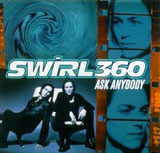
RIYL: Fountains of Wayne, Under the Influence of Giants, The Posies
Florida pinups Denny and Kenny Scott had boy band looks and rock star chops. They co-wrote songs with Adam Schlesinger and Ken Stringfellow, and Mr. Jellyfish Roger Joseph Manning Jr. pitched in on arrangements. Their songs were poppy but crunchy; the girls swoon to the gorgeous harmonies while their boyfriends bob their heads along to the beat. Now look at that release date again: 1998, the middle of Backstreet Boymania. Why oh why did this album not sell three million copies? Because they were on the wrong label: within months of the album’s release, Mercury was absorbed by Universal, and by absorbed, we mean crushed into a cube. Promotion for the album was killed, and it landed in cut-out bins, where it was then rescued by the power pop community…and God love those power pop fanatics, but that may have been the worst thing that’s ever happened to Swirl 360. The band’s biggest champions are now pale, 30-something record store clerks and, well, websites like this one. The Scotts deserve much better than that, they really do. New record this year, they’re threatening. With any luck, history will not repeat itself. In the meantime, “Hey Now Now” and “Candy in the Sun” remain in power rotation. –
David Medsker
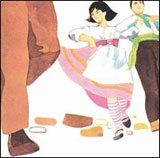
RIYL: AC/DC, Led Zeppelin, The Clash
Austin, Texas, is an amazing ground zero for all sorts of phenomenal indie bands. And if you want your rock done right with killer riffs and more hooks that can be believed, then look no further than this album. On their debut, the Peabodys were just a duo, but they sound like a full-fledged band going completely gonzo in the studio. The album-closing “Negro Spiritual” is the earth-shattering masterpiece here, but everything that leads up to it is essential as well. Dig the funk breakdown in the middle of “Frank,” or the entirety of “Hazzard Co.” (yep, it’s a song about “The Dukes of Hazzard”). There’s also the headiness of “Arrived” and much, much more. This album is just packed with ‘70s-style riffage and punch, so if that’s your thing, then here’s one to enjoy for years to come. The band expanded and followed up this disc with
Unite Tonight – and it was decent, but seemed a lot less focused on the groove and more intent on the flash. Still, the Peabodys are a terrific band and this album is revelatory. –
Jason Thompson

RIYL: Garbage, Siouxsie & the Banshees, The Cure
Before a certain, rain-filled city in the Pacific Northwest stole the spotlight from the rest of the country, the Boston music scene was on the verge of exploding in the early ‘90s. Just beneath the Pixies and Aimee Mann were a slew of talented and diverse bands, some of which eventually made the jump to the mainstream (Letters to Cleo, Mighty Mighty Bosstones). Tragically, one of Boston’s finest, the two-girls-three-boys quintet Tribe, was inexplicably left behind. In terms of being hip or trendy, they weren’t a particularly sexy band, though lead singer Janet LaValley was one of the sexiest frontwomen in rock (ditto keyboardist Terri Barous). They didn’t use Soul II Soul-sampling drum machines or D-tuned guitars, and they didn’t stare down at their feet while playing. What they did, however, was play slick, intricate, insanely melodic rock music, including some odd time signatures that would make Rush proud. The band would only make one more album before disbanding in 1994, but if the fervent response we received from making Tribe the first subject of our Lost Bands column in 2004 is any indication,
Abort is still worshiped by everyone who was lucky enough to hear it. –
David Medsker

RIYL: Josh Rouse, Ben Folds, Al Green
Former Del Fuegos guitarist Warren Zanes has had a bit of a roller coaster ride when it comes to his music career. He joined the Del Fuegos when he was only 17 (brother Dan was the front man) and then after the band broke up, took what everyone would consider an unconventional path for a rock musician by earning a Ph.D. in visual and cultural studies. But as it does with most songwriters, the creativity bug bit Zanes again and he eventually released his debut solo record with Nashville indie label Dualtone in 2002. Incorporating a gift for melody with jazzy pop overtones and the lyrical hooks you would come to expect from a doctor,
Memory Girls is like a trip down memory lane, especially if you dig the warm vocals and lush production qualities of seventies pop music mixed with raw, guitar-driven rock. Think Josh Rouse fronting the Beach Boys and Steely Dan simultaneously – with a doctorate, of course. –
Mike Farley
NOTE: See the first half of the list here.























